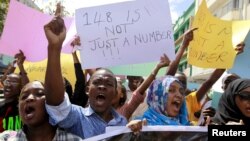Political pressure mounted on Kenya's president on Wednesday with scathing editorials and growing anger at a seven-hour delay in the deployment of a special forces unit that eventually ended the bloody siege at Garissa University last week.
The al-Qaida-aligned al-Shabab group has now killed more than 400 people in Kenya since President Uhuru Kenyatta took office in April 2013, denting the east African nation's image abroad and severely damaging its vital tourism industry.
The pre-dawn attack on the college, 200 km (120 miles) from the Somali border, came a day after Kenyatta berated Britain and Australia for issuing travel advisories, saying their security warnings were "not genuine."
However, Kenyan media, some of them owned by Kenyatta's family, are becoming increasingly critical of the president and government efforts to stop future attacks, drawing comparisons to al-Shabab's assault on Nairobi's Westgate mall, where the Islamists killed 67 people during a four day siege in 2013.
In a front page editorial entitled "If Westgate was a disaster, what do you call Garissa?" Kenya's biggest-selling Daily Nation newspaper singled out Kenyatta for not meeting the grieving families.
"In Kenya, your child ... is slaughtered, but a little time can't be found in busy diaries for the leader you elected to come and look you in your teary eyes and assure you that he did his best, that the death of your son or daughter has not been in vain, that he feels your pain," it said.
The Standard newspaper rounded on the government for its staunch defense of the security response to the deadliest attack in Kenya since 1998, when al-Qaida bombed the U.S. embassy, killing more than 200 people.
"It is ... morally irresponsible for the government's PR machine to go into overdrive after what everyone acknowledges was a lamentable response," it said.
Even after the editorial, the government once again defended its handling of the atrocity, in which 148 people were killed.
"We commend our security agencies for responding promptly and launching rescue operations and saving lives," Defense Minister Rachel Omamo told reporters.
Diplomats dismissed Kenyatta's pledges to improve security as hollow rhetoric.
"There is no strategy," one senior Western diplomat said. "It's like an air stewardess saying there is absolutely nothing to worry about but in fact there is no one in the cockpit."
Even though Kenyatta's position is not under threat in a country where tribal allegiances trump most issues, public trust in the state's ability to protect its citizens is wavering.
Kenya on Wednesday shut down about a dozen Somali remittance firms and froze the accounts of more than 70 people linked to al-Shabab and "terrorism financing", Kamau Thugge, the principal secretary of Kenya's National Treasury, said.
Anger at delay
The anger stems largely from revelations that journalists and politicians from Nairobi arrived at Garissa before the crack Recce police unit, which was delayed at a Nairobi airport for seven hours.
As the four al-Shabab fighters tossed grenades and sprayed bullets at cowering students, the U.S. and Israeli-trained Recce commandos were unable to find a plane to fly them to Garissa, media reported.
Asman Kamama, lawmaker and chairman of the National Security Committee, questioned why Interior Minister Joseph Nkaissary flew to Garissa soon after the 5.30 am raid began while the Recce squad, trained specifically for such incidents, was left behind.
"In future, we will not entertain this," he told Citizen TV.
Once the Recce squad went in, they ended the siege in half an hour. To the fury of Kenyans, their assault began about 12 hours after al-Shabab fighters shot their way into the college.
Survivors who hid under beds and inside cupboards have since recounted how gunmen hunted down fellow students and toyed with them for hours, forcing them to call their parents before executing them.
"I'm angry because maybe if they were there on time, my brother would still be alive," said Alice Iyese, 34, waiting at the Nairobi mortuary to collect her 22-year-old brother's body.
Once the Garissa raid had been declared a "terrorist" attack, local police and soldiers from a nearby garrison could only set up a perimeter and wait at a safe distance, one government source involved in the response said.
"If there had been a quicker response, the death toll would not have been so high," the official told Reuters, adding that the whole chain of command was "not well coordinated."
One Garissa-based policeman said a lack of bulletproof vests meant officers at the scene had little choice but to wait.
"The Recce squad have all these but they came in very late, after much of the damage had already been done," the officer said.






